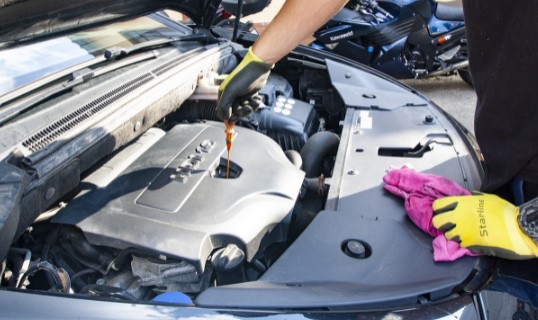One of the vital fluids your car needs to run smoothly are motor oils, which are responsible for keeping your engine clean and lubricated.
The typical car comes with several different types of motor oil for you to choose from at the store. However, many do not understand what each type does or how it works. This article will explain these oils so that everyone can have a good understanding of why they are used in vehicles.
Table of Contents:
Oil Types
There are 4 main types of oil you can use in your engine. hese types of oils are just some variations that can be found at your local auto store. There is no set structure to the types of oil because car manufacturers specify which type they want you to use in their cars. That’s why it’s always best to check your owner’s manual for the specific recommendation because the vehicle may not perform well if you use a different type than what is recommended.

Heavy Duty Oil
Heavy duty oil is designed for trucks and other vehicles that travel under very demanding conditions, such as: frequent short trips, heavy loads, stop and go driving, etc… The engine parts in these vehicles start heating up more during operation due to the extra stress added by these conditions compared with regular use in passenger cars. This higher heat makes multi-grade oils more effective than single-grade oils because the viscosity of the oil is changed by heat. Even though multi-grade oils get better results in these vehicles, full synthetic 0W20 oil will provide superior performance in vehicles that are primarily used for short trips or other demanding conditions.
Multi-grade Oil
A multigrade oil provides several different grades of viscosity which allow it to stay thin enough at cold temperatures to flow easily and heavy enough at high temps to maintain its lubricating properties. The primary benefit of this type of oil is fuel efficiency due to less friction between engine parts when compared with single grade motor oils. This can result in up to a 3% increase in fuel economy
Medium/Standard SAE 5W30 Oil
This is the typical oil found in today’s cars and has been around for a while. It provides good performance and comes in several different viscosities, such as 10W30, 20W50, etc… The reason this type of oil is popular because it can be used in most light to medium sized passenger vehicles that don’t put out very high engine temperatures or require more than 7.5 quarts of oil.
Synthetic Blend Oil
Synthetic blend oils contain an average mix of synthetic and refined motor oils so they provide better protection against engine wear compared with conventional oils , but not quite as good as full synthetic motor oils . This mix also helps increase fuel economy and decrease emissions when compared with conventional motor oil. Full synthetic oils do not contain as many impurities as conventional oil and are better at maintaining viscosity under extreme conditions. They also increase fuel economy by 1-3% over conventional motor oils.
Read also the article on the link, to learn more about the Functions of V-Belt and Other Types of Belts in Your Car.
Full Synthetic 0W20 Oil
This type of oil is a synthetic blend that works extremely well in today’s modern engines because it provides the best protection available from the factory while keeping viscosity high even when temperatures get very cold . It can be used for a longer interval than other types of oils, such as 5,000+ miles compared with 3,000-6,000 miles for conventional oils. This makes full synthetic 0W20 oil more expensive than its counterparts , but it comes out ahead due to its ability to provide superior protection, especially in engines that are primarily used for short trips or other demanding conditions. The benefits provided by this oil are not just centered on fuel economy, but also to do with vehicle performance and even greater protection against engine wear over time.
If you own an older vehicle, make sure it’s not a classic car because full synthetic oils were not available back then . If your vehicle was built before around 1996 , the oil recommendations should be based on the API service classifications SH, SJ, etc… which require conventional mineral oils. These service classifications do not have provisions for 0W20 synthetic oils because they weren’t around when these vehicles were built. They may cause damage to older engines that use these types of oils without the correct internal clearances. If you own a classic car and want to use 0W20 synthetic oil , check the engine owner’s manual or ask your mechanic first before using it.
The choice between single-grade and multi-grade oils depends on the type of driving you do and how much time is spent idling (less than one hour). If your vehicle spends more time idling , such as at stop lights, then a multi-grade oil should be used to provide better protection against engine wear due to the lower operational viscosity.
With my knowledge in car motor oil, I also checked topics about Car Insurance Philippines. I was able to easily find the best insurance company in the Philippines. Within minutes of entering my information into their live chat, I was able to receive my quotation within just minutes. Now that I’ve signed up for a policy and have gained this knowledge, I now have the peace of mind when driving. Knowing that if anything happens to my vehicle, I will be completely covered.
Similar Posts from the same Category:
- Driving safety with perfect brakes
- Driving safely: See and Be Seen Even in the Dark
- Air Conditioning radiator
